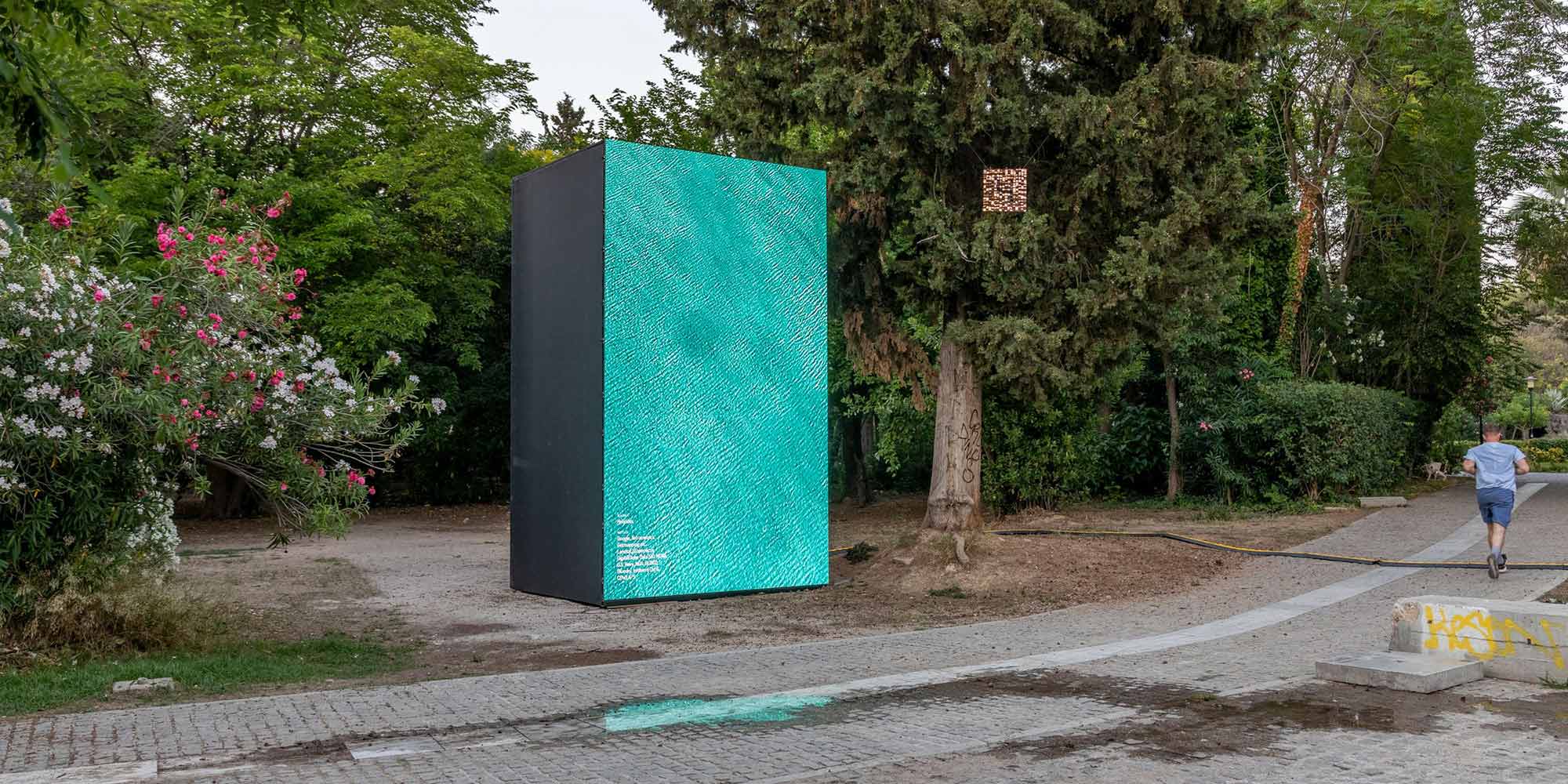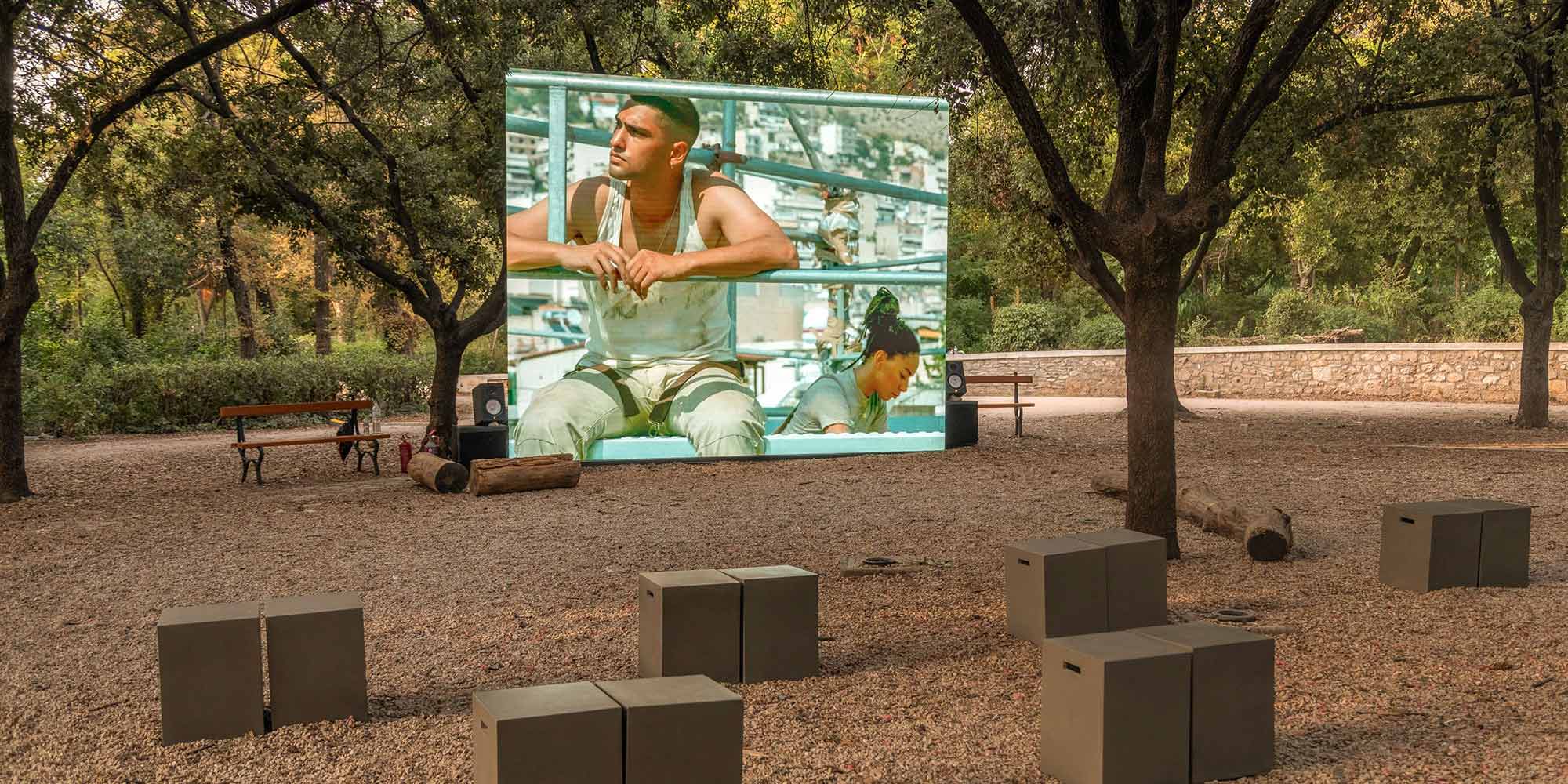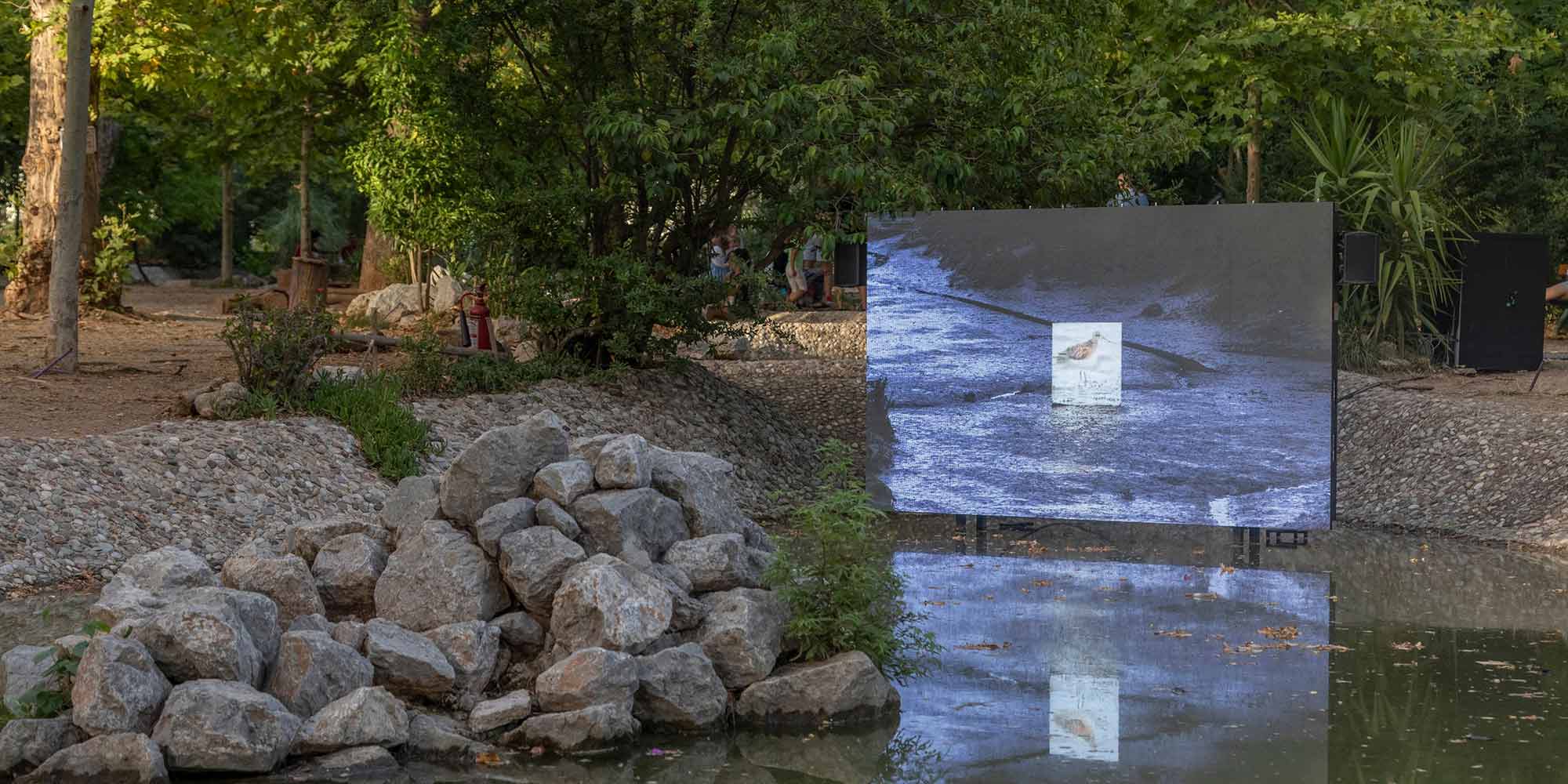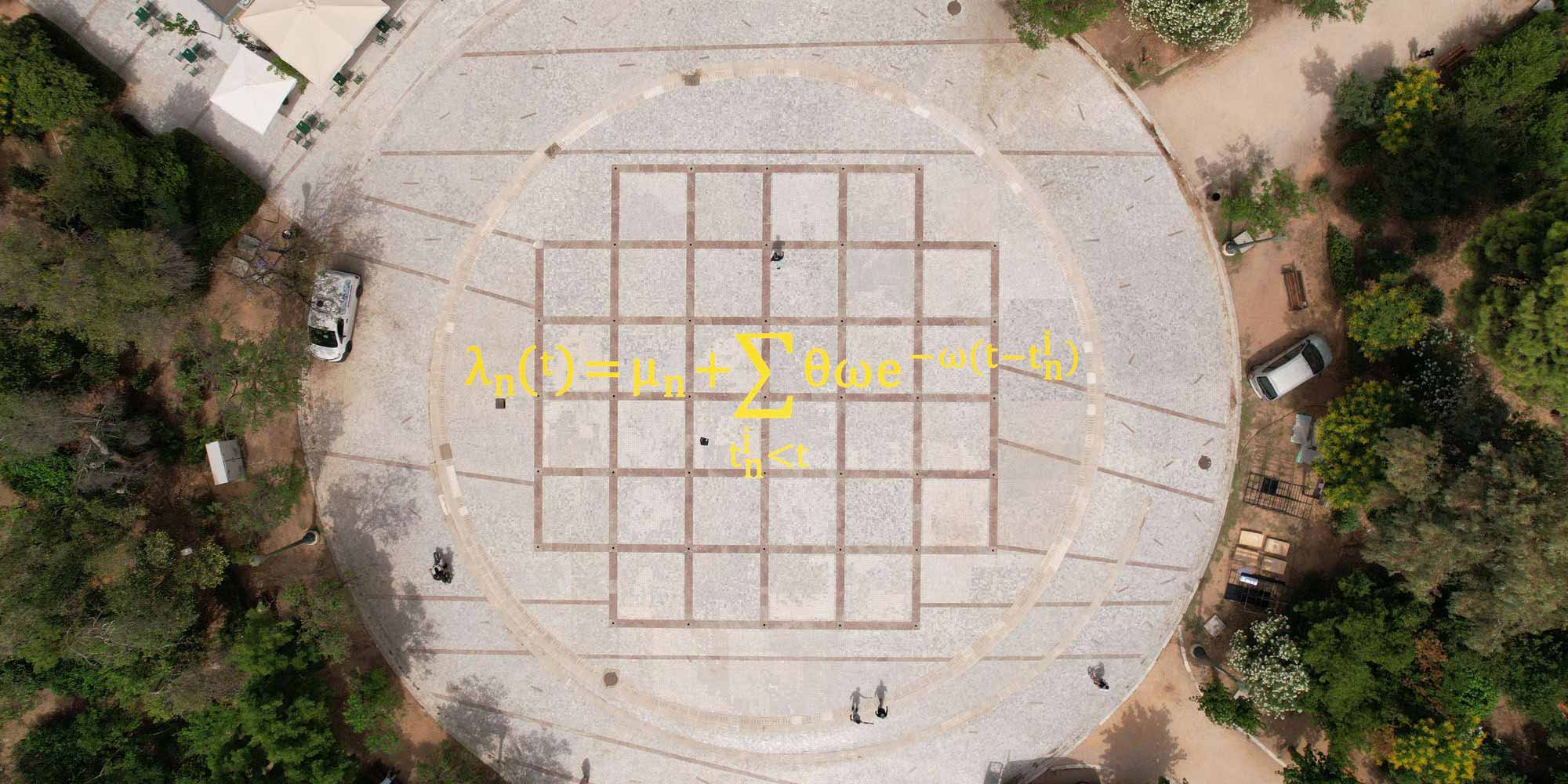Exhibition Documentary
As AI starts to shape our everyday lives, who shapes AI? How are we affected by machines making decisions we might not even be aware of?
You and AI: Through the Algorithmic Lens is a physical exhibition at Pedion tou Areos park in Athens, which took place in the context of a three-week festival by Onassis Stegi between June 24-July 25 2021, exploring how and by whom algorithmic systems are constructed and defined, and how they can impact and reshape society and our perception of the world. Pedion tou Areos is a historically, politically, socially and environmentally important site, a public gathering and leisure space, but also a barometer of socioeconomic changes. The exhibition aimed to initiate much needed conversation around an increasingly technological society and the challenges of the wide adoption of artificial intelligence (AI), algorithmic systems and machine decision making processes in everyday life.
The exhibition at Pedion tou Areos park presented 25 works that included video and sound installations, as well as prints and physical objects, and was divided in three thematic areas:
AI, civic space, participation and democracy
Seeing and being seen through algorithms
Artificial, intelligence and nature
The exhibition was curated by Irini Mirena Papadimitriou (FutureEverything).
Video

The Wandering Mind, s8@Stelios Tzetzias

The Substitute, Alexandra Daisy Ginsberg@Stelios Tzetzias

INSULAE [Of the Island], Nye Thompson@Stelios Tzetzias

I BELONG TO MYSELF, EVI KALOGIROPOULOU@Stelios Tzetzias

CUSP, JAKE ELWES@Stelios Tzetzias
ZurückWeiter
Irini Mirena Papadimitriou: is a curator and cultural manager, whose practice draws on interdisciplinary and critical discourse to explore the impact of technology in society and culture, and the role of art in helping us engage with contemporary issues. Currently Creative Director at FutureEverything, an arts organization and innovation lab in Manchester, she was previously Digital Programmes Manager at the V&A and Head of New Media Arts Development at Watermans.
Memo Akten: is a computational artist, engineer, and computer scientist working with emerging technologies to create images, sounds, experimental films, large-scale responsive installations and performances. Fascinated by trying to understand the nature of nature and the human condition, he works in and draws inspiration from fields such as biological and AI, computational creativity, perception, consciousness, neuroscience, fundamental physics, ritual and religion.
Algorithmic Justice League: AJL is an organization that combines art and research to illuminate the social implications and harms of artificial intelligence. AJL’s mission is to raise public awareness about the impacts of AI, equip advocates with empirical research to bolster campaigns, build the voice and choice of most impacted communities, and galvanize researchers, policymakers, and industry practitioners to mitigate AI bias and harms.
Hiba Ali: is a producer of moving images, sounds, couture, and words. They work on two long term art and publication projects: an art-based PhD project that examines womyn of colour’s labor, and architecture of surveillance as it exists within the monopoly of Amazon (corp.); and the Black Indian Ocean project which features the music, cloth, and ritual of African descent communities across the Indian Ocean region.
Bill Balaskas: is an artist, theorist, and educator, whose research is located at the intersection of contemporary politics, digital media, and visual culture. His works have been widely exhibited internationally, in museums, galleries, festivals and public spaces. Balaskas is an Associate Professor and Director of Research, Business and Innovation at the School of Art and Architecture of Kingston University, London.
Stop LAPD Spying Coalition: Formed in 2011, the Stop LAPD Spying Coalition is led by community members from diverse backgrounds, including youth, formerly incarcerated people, academics, undocumented immigrants, unhoused people, artists, community groups, and many more. Their organizing model is centered in the stolen Tongva territory called Los Angeles, but with regional, national, and international implications.
Tega Brain: is an Australian-born artist and environmental engineer whose work examines issues of data, ecology, and infrastructure. She has created wireless networks that respond to natural phenomena, systems for obfuscating fitness data, and an online smell-based dating service. Her work has been shown in the Vienna Biennale for Change and the Guangzhou Triennial, among others. She is an Assistant Professor of Integrated Digital Media, NYU.
Julian Oliver: is a critical engineer, artist, and activist based in Berlin. Exhibiting since 1996, his projects and lectures have been presented at many museums, international electronic-art events and conferences, including the Tate Modern, Transmediale, Ars Electronica, The Chaos Computer Congress, FILE, and the Japan Media Arts Festival. Work made by Julian, or in collaboration with others, has received several awards.
Bengt Sjölén: is an independent software and hardware designer, hacker, and artist based in Stockholm and Berlin with roots in the Atari demo scene. He collaborates within several networks like Weise7 and Hackteria. His work follows many different threads, spanning subjects such as biology, software radio, electromagnetic fields, and artificial intelligence. His work has been presented internationally in events like Arte Mov, Ars Electronica, and Synthetic Times.
Catherine D’Ignazio: is a scholar, artist/designer, and hacker mama who focuses on feminist technology, data literacy, and civic engagement. Her 2020 book from MIT Press, “Data Feminism,” co-authored with Lauren Klein, charts a course for more ethical and empowering data science practices. D’Ignazio is an Assistant Professor of Urban Science and Planning in the Department of Urban Studies and Planning at MIT. She is also Director of the Data + Feminism Lab, which uses data and computational methods to work towards gender and racial equity, particularly in relation to space and place.
Lauren Klein: is an Associate Professor in the departments of English and Quantitative Theory & Methods at Emory University, where she also directs the Digital Humanities Lab. Before moving to Emory, she taught in the School of Literature, Media, and Communication at Georgia Tech. Klein works at the intersection of digital humanities, data science, and early American literature, with a research focus on issues of gender and race.
Marcia Diaz Agudelo: is a Colombian-Canadian designer, Illustrator, and motion graphics artist. Her work is inspired by her South American roots. She loves color, textures, rhythm, and complex subjects. She has worked as a designer on projects in the intersection of design, technology, and social justice. As a creative thinker she strives to find innovative ways of solving problems. Her work has been exhibited in Toronto and Mexico City.
Stephanie Dinkins: is a transmedia artist and professor at Stony Brook University where she holds the Kusama Endowed Chair in Art. She creates platforms for dialog about AI as it intersects race, gender, aging, and our future histories. She is particularly driven to work with communities of color to co-create more equitable, values grounded artificial intelligent ecosystems. Dinkins’ art practice includes lens-based practices, emerging technologies, and community engagement.
Jake Elwes: is an artist living and working in London. His recent works have looked at machine learning and AI research, exploring the code, philosophy, and ethics behind it. In his art Jake engages with both the history and tropes of fine art and the possibilities and consequences of digital technology. He graduated with a BA in Fine Art from the Slade School of Fine Art (UCL) in London, in 2017.
Entangled Others (Sofia Crespo & Feileacan McCormick): Entangled Others is a shared studio practice of artists Feileacan McCormick and Sofia Crespo. Their work focuses upon ecology, nature, and generative arts, with an emphasis on giving the more-than-human new forms a presence and life in digital space. This involves exploring questions of relationship, biodiversity, and awareness through biology-inspired technologies. In turn, they highlight how through conscious efforts, new technology can be used to bring attention and awareness to the unseen.
Alexandra Daisy Ginsberg: is an artist examining our fraught relationships with nature and technology. Daisy’s work explores subjects as diverse as AI, synthetic biology, conservation and evolution, as she investigates the human impulse to “better” the world. She has exhibited at MoMA New York, the Museum of Contemporary Art, Tokyo, the National Museum of China, the Centre Pompidou and the Royal Academy, with her first solo show at Vitra Design Museum in 2019.
Kyriaki Goni: is an artist based and born in Athens. Through multimedia installations, she critically touches on questions of technology and society interaction, such as privacy and surveillance, control of information, networks and infrastructures, as well as human-machine relationships. She has received commissions and fellowships such as the New Networked Normal (Creative Europe) and Artworks (Stavros Niarchos Foundation).
Evi Kalogiropoulou: is a visual artist working in Athens and London. Evi has studied at the Athens School of Fine Arts and accomplished a Master at the Royal College of Art, London. She is an Artist in Residency at Somerset House Studios, London. She mostly works with moving image works, and experimental films. Her projects explore ideas associated with the inclusion/exclusion, cross-culture identity, female figures in ancient Greek mythology frames, and post-apocalyptic environments.
Katerina Kana: is an artist based in Cyclades, Greece. In her practice, she explores the emerging new reality of our contemporary world, using the techniques of ancient marble sculpture. She carves inscriptions on marble blocks, dedicated to the culture of a society embedded in computing tech. Katerina Kana graduated from Central Saint Martins College of Art and Design and has exhibited work in art institutions, galleries, and off-sites such as theaters and clubs across Europe.
Egor Kraft: Interdisciplinary artist and researcher Egor Kraft lives and works in Berlin and Moscow. His practice spans across media, science, critical research, philosophy, and art. He graduated from Rodchenko School, Academy of Arts Vienna, Central St. Martins College, and Strelka Institute. He was nominated for the Lumen Prize, Pulsar, Innovation, Kandinsky, and Re:Humanism, amongst other prizes, and became a STARTS residencies fellow and Garage Museum Art & Technology Grant recipient.
Ilan Manouach: is a conceptual comics artist, an AI entrepreneur and a strategy consultant for Onassis Publications. He is currently doing a PhD at Aalto University on comics epistemology exploring the effects of frontier technologies, synthetic media, fintech and globalized logistics on the comics industry. He is mostly known for Shapereader, a system for tactile storytelling initially designed for people with visual disabilities.
Manolis Manousakis: has worked as a composer and sound designer since 1998. Born in Athens, he studied composition and direction at Columbia College Chicago in Illinois. His oeuvre includes works for small ensembles, solos, electroacoustic compositions, video art, and multimedia shows. He has also written music and created sound design for films, interactive installations, theater shows, documentaries, television series, and dance theater productions.
Afroditi Panagiotakou: is Director of Culture at the Onassis Foundation. She is responsible for the strategic planning and development of Onassis Culture, and oversees the cultural initiatives and programming of the Foundation, including Onassis Stegi in Athens and the Onassis affiliates in New York and Los Angeles. The Onassis Culture program she has developed incorporates major commissioning and presentation programs of a cross-disciplinary nature.
Naho Matsuda: is a German-Japanese artist, designer, and researcher based in London, UK. Her work explores the blurring boundaries of language and the technologies we use to communicate through. Her multidisciplinary work brings together the ordinary and the absurd to explore notions such as labor, and internet culture. Naho currently holds a post as a researcher in the Interaction Research Studio at Goldsmiths UoL and teaches on the MA Graphic Design at Kingston School of Art.
Helena Nikonole: is a new media artist, independent curator, and educator interested in technological progress and its implications. Embracing hybridity, new aesthetics, bio-semiotics, and AI. She focuses on the implications of new technologies that techno-evangelists and scientists are unable or unlikely to realise. She presents lectures and workshops in the field of Art and Science, and machine learning in the arts.
Anna Ridler: is an artist and researcher who works with systems of knowledge and how technologies are created in order to better understand the world. She is particularly interested in ideas around measurement and quantification and how this relates to the natural world. Her process often involves working with collections of information or data, particularly data sets, to create new and unusual narratives. Her work has been exhibited widely at cultural institutions worldwide.
slow immediate: is the creative studio of Gershon Dublon and Xin Liu. To them, immediacy to the self and to the environment is pivotally important to being human on our shared planet. As artists and electrical/mechanical engineers, their practices range from performances, sculptures, and films to technological systems and academic papers. slow immediate is a member of the New Museum’s ONX Studio, and were the inaugural winners of the European Artificial Intelligence Lab residency.
Jenna Sutela: works with words, sounds, and other living media, such as Bacillus Subtilis Nattō Bacteria and the “many-headed” slime mold Physarum Polycephalum. Her audiovisual pieces, sculptures, and performances seek to identify and react to precarious social and material moments, often in relation to technology. Sutela’s work has been presented at museums and art contexts internationally, including Guggenheim Bilbao, Moderna Museet, and Serpentine Galleries.
Nye Thompson: Artist Nye Thompson (UK) is known for her experimental software architectures exploring network-embedded power dynamics and machinic visions of the world. In 2016, her first solo show was described by C4 News as “too shocking to broadcast,” becoming global clickbait and triggering an international government complaint. Since then, she has exhibited at venues including Tate Modern, The Barbican, The V&A, ZKM Karlsruhe, Ars Electronica, and others.
Mushon Zer-Aviv: is a designer, researcher, educator, and media activist based in Tel Aviv. His love/hate relationship with data informs his design work, art pieces, activism, research, teaching, workshops, and city life. Among Mushon’s collaborations, he is the Co-founder of Shual.com – a foxy design studio; and multiple government transparency and civic participation initiatives with the Public Knowledge Workshop. Mushon also designed the maps for Waze.com and led the design of Localize.city.
Dan Stavy: is a creative coder and media artist based in Tel Aviv. He specializes in interactive installations using sensors (depth camera, smartphone, sound, etc.). Dan worked at Scott Snibbe studio in San Francisco, creating large art/science installations for museums around the world. He was designing virtual sets at the end of the last decade at Orad Ltd. Dan exhibited as part of a Google DevArt project at Fresh Paint (the biggest art fair in Israel).
Eran Weissenstern: is a software engineer based in New York. He’s seeking for the boundaries between the imaginary and the real; trying to bridge human and machine. Eran has designed and developed several interactive installations for museums, proof-of-concept demos for start-up companies and gesture-based control paradigms for natural user interfaces. He holds several patents for gesture-based interfaces, and is an expert in real-time image processing and visualization.
Credits
Director: Christos Sarris
Director of Photography: Evan Maragkoudakis
Cameras: Filippos Zamidis, Dimitris Zivopoulos, Koralia Dogani
Drone Operator and Camera: Orfeas Kalafatis
Drone Operator: Giorgos Papacharalampous
Recording: Vassilis Zampikos
Video Crew Assistant: Andreas Markou
Editor: Tryfon Karatzinas
Colorist: Manthos Sardis
Speech Editing-Voice Over: Sakis Ioannidis
Subtitles: AUTHORWAVE
Production Coordination: Smaragda Dogani, Elena Choremi
Production Assistant: Aggelika Stavropoulou
Onassis Creative Studio
Head of Creative: Christos Sarris
Motion Graphics: Constantinos Chaidalis
“You and AI: Through the Algorithmic Lens” festival credits:
Curated by Irini Mirena Papadimitriou, FutureEverything
Curatorial Direction: Afroditi Panagiotakou
Executive Director / Scientific Advisor: Prodromos Tsiavos
Exhibition Design / Exhibition Production Lead: Studioentropia Architects (Yota Passia, Panagiotis Roupas)
Artistic Direction: Polydoros Karyofyllis (Poka-Yio)
Executive Producer: Christos Carras
Technical Director: Lefteris Karabilas
Production Coordination: Heracles Papatheodorou, Katerina Varda
Line Production: Despina Sifniadou, Yorgos Stergiou, Spyridoula Gerazi
Commissioned and produced by Onassis Stegi
In the context of the European ARTificial Intelligence Lab network
Co-funded by the Creative Europe programme of the European Union







